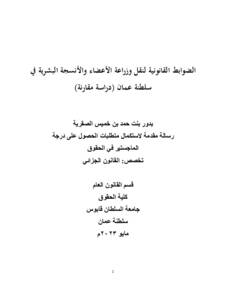وثيقة
الضوابط القانونية لنقل وزراعة الأعضاء والأنسجة البشرية في سلطنة عمان : دراسة مقارنة.
عناوين أخرى
Legal controls for the transfer and transplantation of human organs and tissues in the Sultanate of Oman
الناشر
جامعة السلطان قابوس.
ميلادي
2023
اللغة
العربية
الملخص الإنجليزي
This study aims to identify the legal controls for the transfer and transplantation of human organs
and tissues in the Sultanate of Oman. In addition to determining the civil and penal liability
resulting from the violation of these controls. The study adopted a comparative descriptive
analytical approach. Referred to the opinions of jurists, legal texts and their analysis, and the
comparison between the texts of Omani law and Egyptian law and other comparative legislation.
The study referred to a set of results, the most important of which are: The legality of organ
transfers and transplants is based on three theories. The theories are the theory of necessity, the
theory of reason, and the theory of social interest. The legislator set a set of general legal controls
for the legitimacy of these operations, including the donor's satisfaction, the donor's eligibility, the
availability of the case of necessity, and the process not conflicting with the public order. On the
other hand, the legislator prohibited these operations in the event that they are for a non-therapeutic
purpose, in the event that the tissue or organ required to be transferred and transplanted has been
obtained for a fee in any form, or in the event that it has been purchased for material or in-kind
consideration. These operations entail civil liability in the event of damage resulting from a
medical error, while criminal liability is established in the event of violation of the legal controls
governing these operations, such as using organs obtained through the sale of goods or causing
permanent disability or death. The study recommends the development of a special for organizing
the transfer and transplantation of human organs and tissues.
المجموعة
URL المصدر
الملخص العربي
تهدف هذه الدراسة إلى التعرف على الضوابط القانونية لنقل وزراعة الاعضاء والانسجة البشرية في سلطنة عمان، وتحديد المسؤولية المدنية والجزائية المترتبة على الاخلال بهذه الضوابط. اعتمدت الدراسة المنهج الوصفي التحليلي المقارن، حيث تم الرجوع إلى آراء الفقهاء، والنصوص القانونية وتحليليها، والمقارنة بين نصوص التشريع العماني و التشريع المصري وغيره من التشريعات المقارنة. أشارت الدراسة إلى مجموعة من النتائج، أهمها،استنادمشروعية عمليات نقل وزراعة الاعضاء إلى ثلاث نظريات، نظريةالضرورة المقترنة برضا المتبرع ونظرية السبب المشروع ونظرية المصلحة الاجتماعية. وضع المشرع مجموعة من الضوابط القانونية العامة وتشمل، رضا المتبرع، أهلية المتبرع، توافر حالة الضرورة، وعدم تعارض العملية مع النظام العام. في المقابل حظر المشرع هذه العمليات في حال كونها لغرض غير عالجي، أو في حال تم الحصول على النسيج أو كانتصورت ً العضو المطلوبنقلهوزراعتهقد تم الحصول عليهبمقابل أيا ه، أو في حال تم شراؤه بمقابل مادي أو عيني.ويترتب على هذه العمليات مسؤولية مدنية في حال وقوع ضررناتج عن خطأ طبي،فيما تقام مسؤولية جزائيةفي حال مخالفةالضوابط القانونيةالتيتحكم هذه العمليات كاستخدام أعضاءتم الحصول عليهامن خلال البيع أو التسبب بعاهة مستديمة أو وفاة، كما تنشأ المسؤولية التأديبية لألطباء في حال مخالفة الضوابط المنصوص عليها في التشريع عند القيام بمثل هذه العمليات، و ستقتصر الدراسة فالحديث عن المسؤولية المدنية والمسؤولية الجزائية، فيما توصي الدراسة بوضع نظام تشريعي متكامل خاص لتنظيم القيام بعمليات نقل وزراعة الاعضاء والانسجة البشرية.
قالب العنصر
الرسائل والأطروحات الجامعية

